python10作业思路及源码:类Fabric主机管理程序开发(仅供参考)
类Fabric主机管理程序开发
一,作业要求
1, 运行程序列出主机组或者主机列表(已完成)
2,选择指定主机或主机组(已完成)
3,选择主机或主机组传送文件(上传/下载)(已完成)
4,充分使用多线程或多进程(已完成)
5,不同主机的用户名,密码,端口可以不同(已完成)
6,可向主机或主机组批量发布命令(已完成)
7,可一次性执行多条操作命令(已完成)
二,程序文件清单
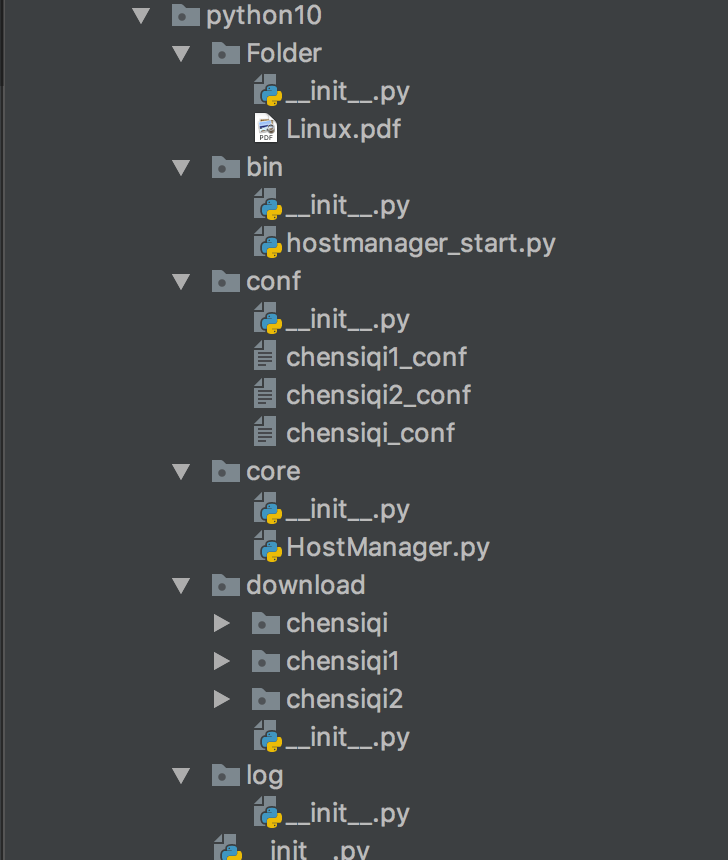
三,程序流程简图
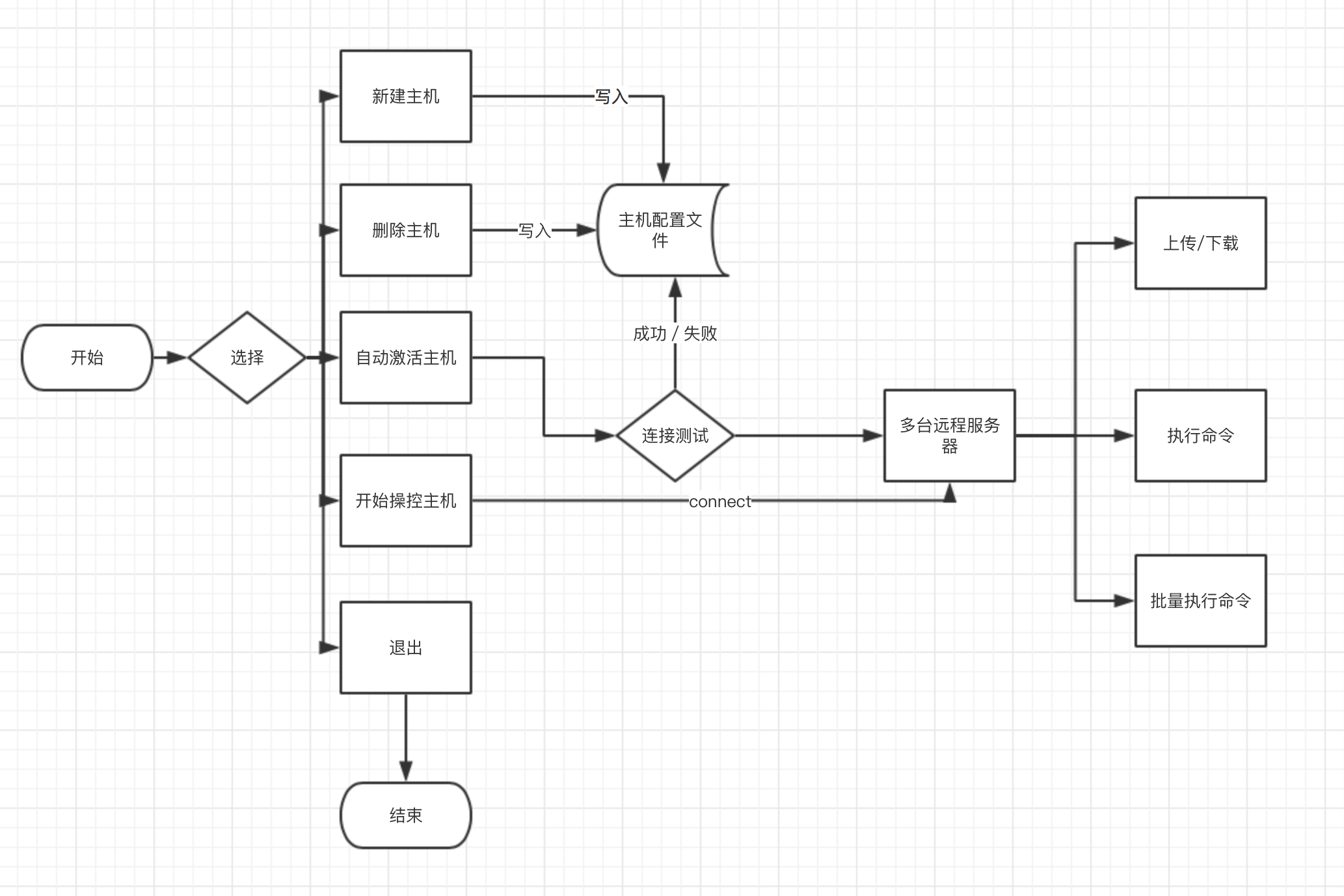
四,程序测试样图
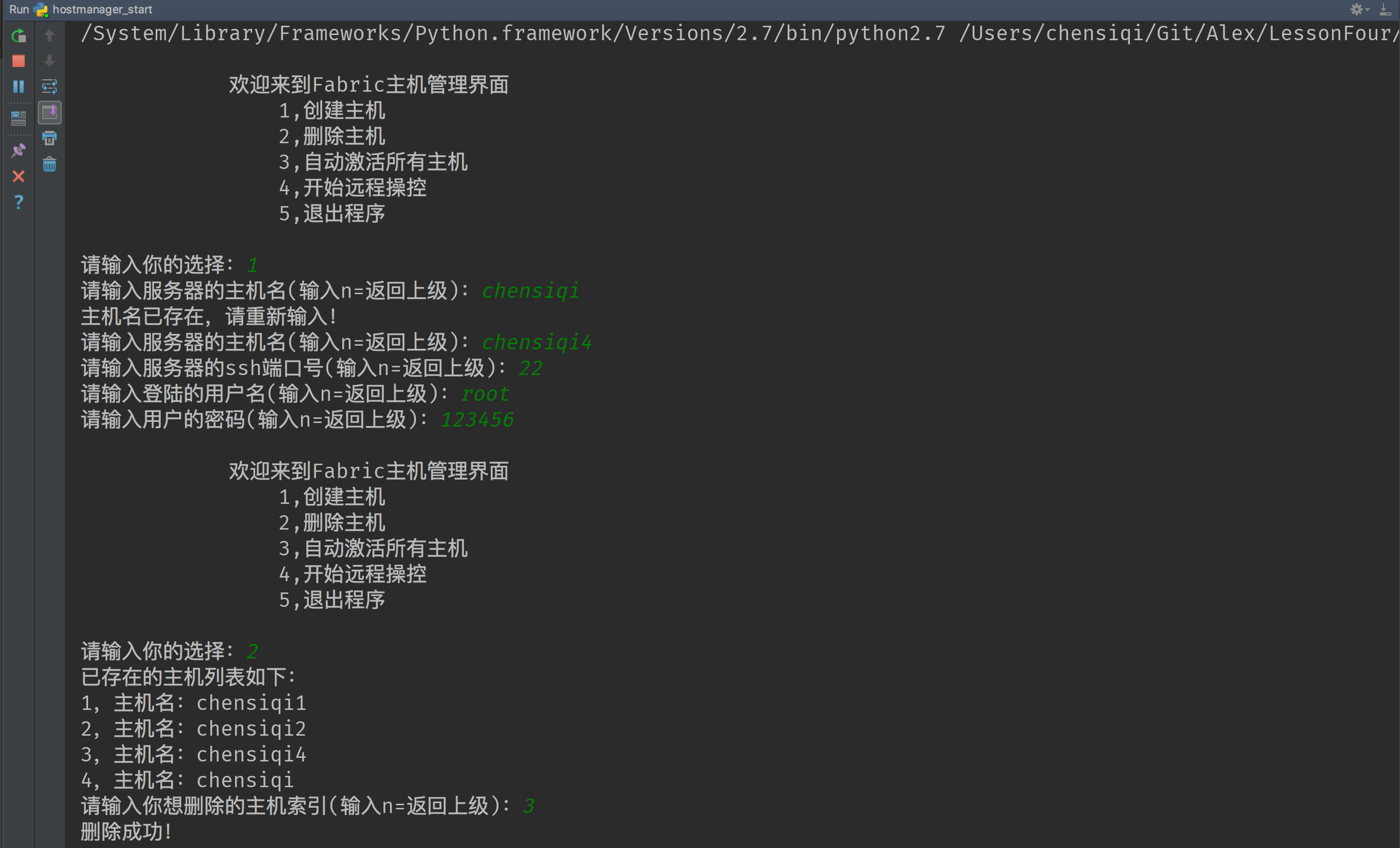
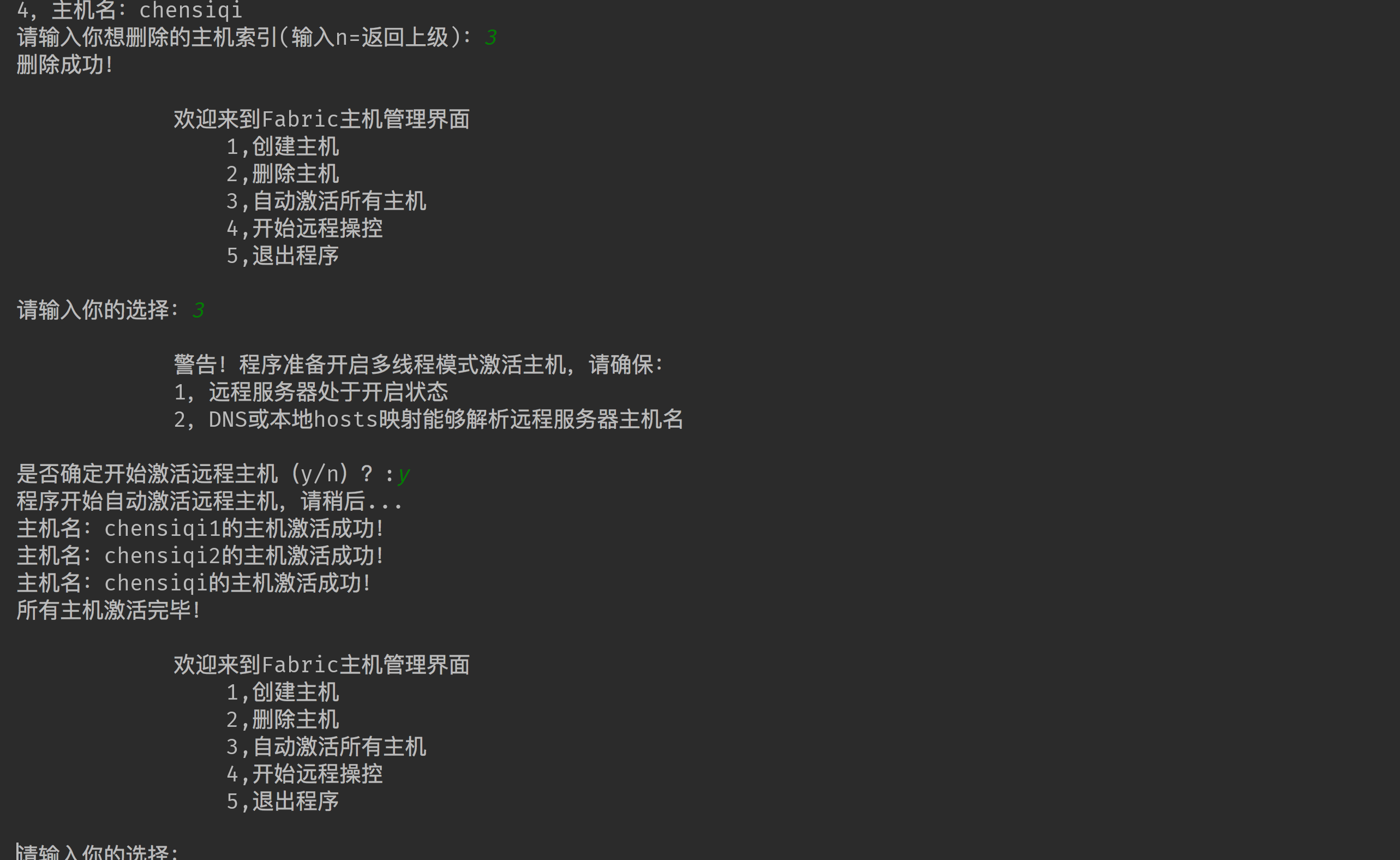
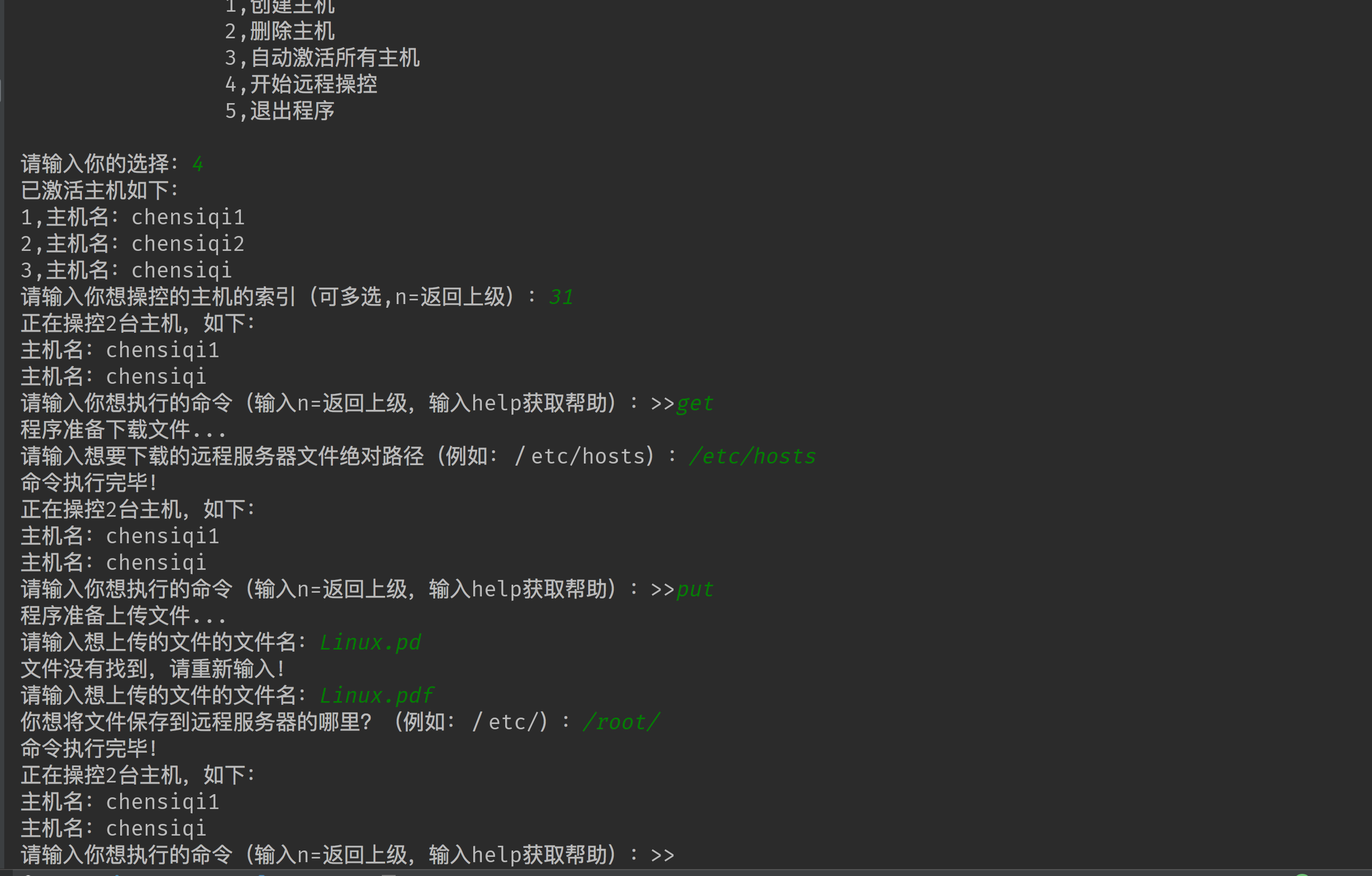
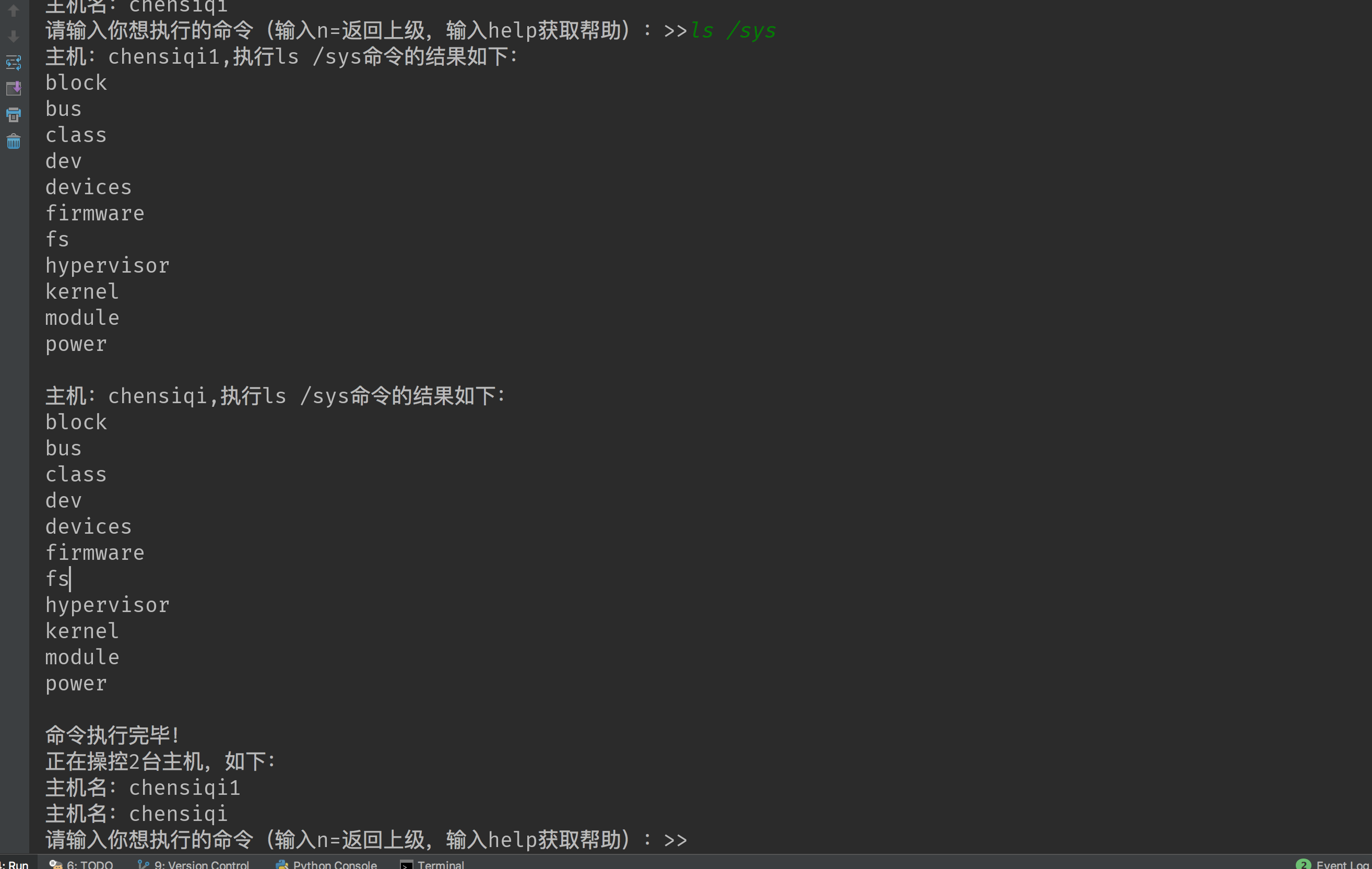
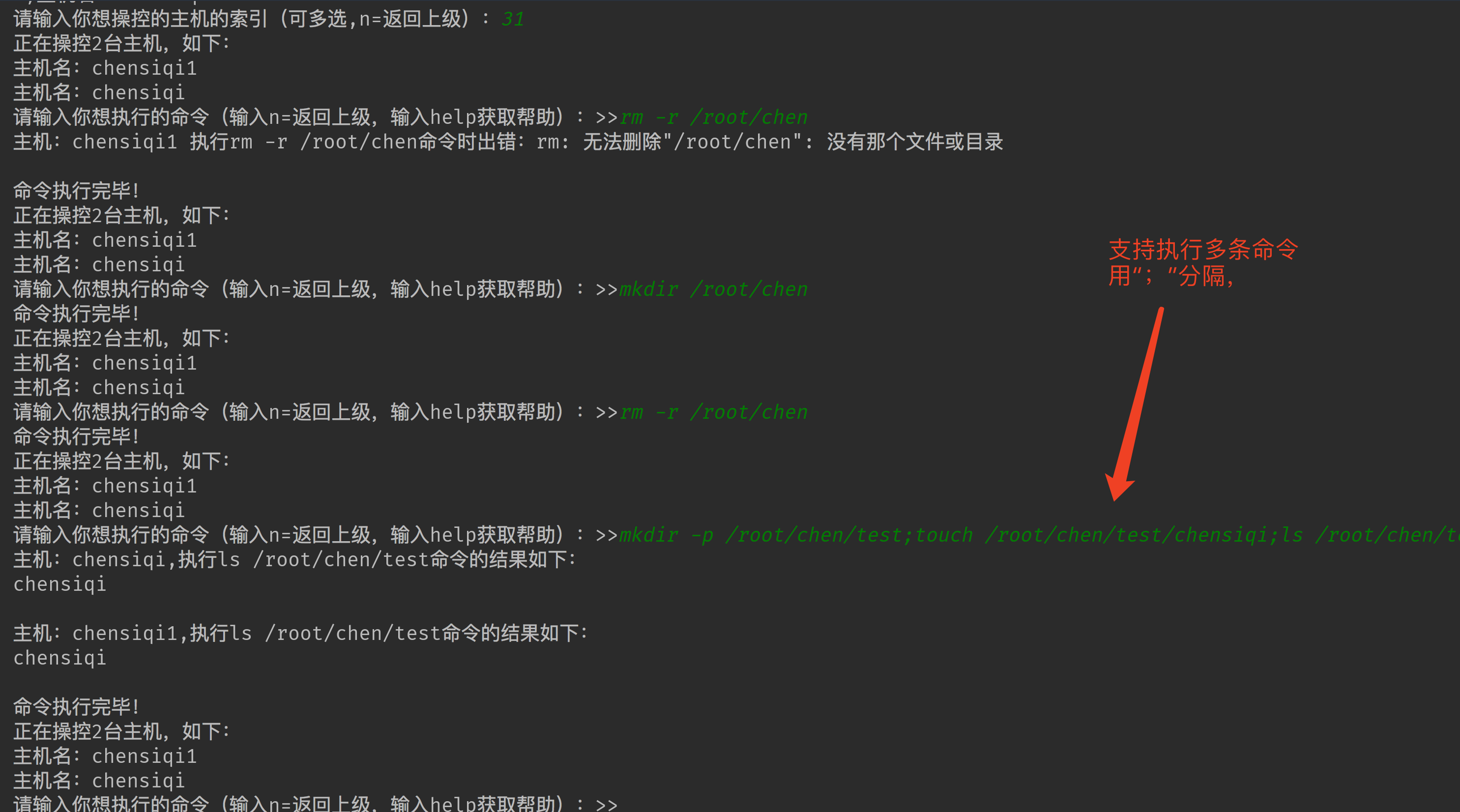
五,程序核心源码
#!usr/bin/env python
# -*- coding:utf-8 -*-
# auther:Mr.chen
# 描述:只能运行在MacOS或linux系统下
import os,sys,pickle,time
import paramiko,threading
sys.path.append('..')
PATH = os.path.dirname(os.path.abspath(__file__))
PUT_PATH = PATH.replace('core','Folder/')
GET_PATH = PATH.replace('core','download/')
CONF_PATH = PATH.replace('core','conf/')
semaphore = threading.BoundedSemaphore(1) # 进程锁
def new_Host():
while True:
hostname = raw_input("请输入服务器的主机名(输入n=返回上级):")
if os.path.exists(CONF_PATH+hostname+'_conf'):
print ("主机名已存在,请重新输入!")
continue
if hostname =='n':
return
port = raw_input("请输入服务器的ssh端口号(输入n=返回上级):")
if port == 'n':
return
username = raw_input("请输入登陆的用户名(输入n=返回上级):")
if username == 'n':
return
password = raw_input("请输入用户的密码(输入n=返回上级):")
if password == 'n':
return
dic = {
'hostname':hostname, # 主机名
'port':port, # 端口
'username':username, # 用户名
'password':password, # 密码
'status':0 # 状态(0:未激活 1:已激活 2:激活失败)
}
if os.path.isdir(GET_PATH + hostname) == False:
command = 'mkdir ' + GET_PATH + hostname
os.system(command)
re = hostmessage_Write(dic)
if re == True:
return
else:
print ("主机信息存储失败,请检查原因!")
def delete_Host():
List = Traverse_folder()
while True:
dic = {}
num = 0
print ("已存在的主机列表如下:")
for i in List:
print ("{0},主机名:{1}".format(str(num+1),i))
dic[str(num+1)] = i
num += 1
choose = raw_input("请输入你想删除的主机索引(输入n=返回上级):")
if choose == 'n':
return
elif choose in dic:
hostname = dic[choose]
command = 'rm -f '+CONF_PATH+hostname+'_conf'
os.system(command)
print ("删除成功!")
break
else:
print ("您的输入有误!")
def auto_activeHost():
text = """
警告!程序准备开启多线程模式激活主机,请确保:
1,远程服务器处于开启状态
2,DNS或本地hosts映射能够解析远程服务器主机名
"""
while True:
print (text)
choose = raw_input("是否确定开始激活远程主机(y/n)?:")
if choose == 'n':
return
elif choose == 'y':
break
else:
print ("你的输入有误!")
print ("程序开始自动激活远程主机,请稍后...")
List = Traverse_folder()
if len(List) == 0:
print ("请先创建主机!")
return
for i in List:
dic = hostmessage_Read(i)
t = threading.Thread(target=auto_Active,args=(dic,)) # 创建多线程对象
t.setDaemon(True) # 将对象设置为守护线程
t.start() # 线程开启
while threading.activeCount() != 1: # 当前活跃的线程数
pass
else:
print ("所有主机激活完毕!")
time.sleep(2)
def auto_Active(dic):
ssh = paramiko.SSHClient() # 创建ssh对象
ssh.set_missing_host_key_policy(paramiko.AutoAddPolicy()) #允许连接不在know_hosts文件中的主机
try:
ssh.connect(hostname=dic['hostname'],port=int(dic['port']),username=dic['username'],password=dic['password'],timeout=10)
except Exception,e:
print ("主机名:{0}的主机激活失败!失败原因:{1}".format(dic['hostname'],e))
dic['status'] = 2
hostmessage_Write(dic)
else:
print ("主机名:{0}的主机激活成功!".format(dic['hostname']))
dic['status'] = 1
hostmessage_Write(dic)
finally:
ssh.close()
def remote_Host():
List = Traverse_folder(key='status',value=1)
if len(List) == 0:
print ("请先激活主机!")
return
while True:
dic = {}
print ("已激活主机如下:")
num = 0
for i in List:
print ("{0},主机名:{1}".format(str(num+1),i))
dic[str(num+1)] = i
num += 1
choose = raw_input("请输入你想操控的主机的索引(可多选,n=返回上级):")
if choose == 'n':
return
choose = list(set(choose)) #去重复
if set(choose) & set(dic.keys()) == set(choose):
LIST = []
for i in choose:
LIST.append(dic[i])
remote_Host_control(LIST)
else:
print ("您的输入有误!")
def remote_Host_control(List):
help = """
help帮助提示:
1.程序的Folder目录是本地文件目录
2,输入put向远程主机上传文件
3,输入get向远程主机下载文件
4,输入其他直接向远程主机发布命令
"""
while True:
print ("正在操控{0}台主机,如下:".format(len(List)))
for i in List:
print ("主机名:{0}".format(i))
command = raw_input("请输入你想执行的命令(输入n=返回上级,输入help获取帮助):>>")
if command == 'n':
return
elif command == 'help':
print help
elif command == 'get':
print ("程序准备下载文件...")
remote_path = raw_input("请输入想要下载的远程服务器文件绝对路径(例如:/etc/hosts):")
LIST = remote_path.split('/')
filename = LIST[len(LIST)-1]
for i in List:
local_path = GET_PATH + i + '/'+filename
t = threading.Thread(target=get_Method,args=(i,[remote_path,local_path]))
t.setDaemon(True)
t.start()
while threading.activeCount() != 1:
pass
else:
print ("命令执行完毕!")
elif command == 'put':
print ("程序准备上传文件...")
while True:
filename = raw_input("请输入想上传的文件的文件名:")
if os.path.exists(PUT_PATH+filename) == False:
print ("文件没有找到,请重新输入!")
continue
local_path= PUT_PATH+filename
remote_path = raw_input("你想将文件保存到远程服务器的哪里?(例如:/etc/):")
remote_path = remote_path + '/' + filename
for i in List:
t = threading.Thread(target=put_Method, args=(i, [local_path,remote_path]))
t.setDaemon(True)
t.start()
while threading.activeCount() != 1:
pass
else:
print ("命令执行完毕!")
break
else:
for i in List:
t = threading.Thread(target=execute_Command,args=(i,command))
t.setDaemon(True)
t.start()
while threading.activeCount() != 1:
pass
else:
print ("命令执行完毕!")
def put_Method(hostname,Path):
dic = hostmessage_Read(hostname)
transport = paramiko.Transport((hostname, int(dic['port'])))
try:
transport.connect(username=dic['username'], password=dic['password'])
sftp = paramiko.SFTPClient.from_transport(transport)
sftp.put(Path[0], Path[1])
except Exception, e:
print ("主机名:{0},上传失败!错误原因:{1}".format(hostname, e))
else:
pass
finally:
transport.close()
def get_Method(hostname,Path):
dic = hostmessage_Read(hostname)
transport = paramiko.Transport((hostname,int(dic['port'])))
try:
transport.connect(username=dic['username'],password=dic['password'])
sftp = paramiko.SFTPClient.from_transport(transport)
sftp.get(Path[0],Path[1])
except Exception,e:
print ("主机名:{0},下载失败!错误原因:{1}".format(hostname,e))
else:
pass
finally:
transport.close()
def execute_Command(hostname,command):
dic = hostmessage_Read(hostname)
ssh = paramiko.SSHClient()
ssh.set_missing_host_key_policy(paramiko.AutoAddPolicy())
try:
ssh.connect(hostname=hostname,port=int(dic['port']),username=dic['username'],password=dic['password'])
command_list = command.strip().split(';')
except Exception,e:
semaphore.acquire() # 线程锁开启
print ("主机:{0}连接出现异常:{1}".format(hostname,e))
semaphore.release() # 线程锁释放
return
for com in command_list:
stdin, stdout, stderr = ssh.exec_command(com)
error = stderr.read()
output = stdout.read()
semaphore.acquire() # 线程锁开启
if len(error) != 0:
print ("主机:{0} 执行{1}命令时出错:{2}".format(hostname,com, error))
if len(output) != 0:
print ("主机:{0},执行{1}命令的结果如下:".format(hostname,com))
print (output)
semaphore.release() # 线程锁释放
def Traverse_folder(key = None,value = None):
'''
根据条件遍历某文件夹里的全部文件内容,
找出符合条件的文件返回包含主机名的列表
如果无条件,则返回包含所有主机名的列表
:return:LIST
'''
LIST = []
List = os.listdir(CONF_PATH)
for i in List:
if i == '__init__.py' or i == '__init__.pyc':
continue
else:
with open(CONF_PATH+i,'r') as f:
dic = pickle.load(f)
if key != None:
if dic[key] == value:
LIST.append(dic['hostname'])
else:
LIST.append(dic['hostname'])
return LIST
def hostmessage_Write(dic):
with open(CONF_PATH+dic['hostname']+'_conf','w') as f:
pickle.dump(dic,f)
return True
def hostmessage_Read(hostname):
if os.path.exists(CONF_PATH+hostname+'_conf'):
with open(CONF_PATH+hostname+'_conf','r') as f:
dic = pickle.load(f)
return dic
def Main():
text = """
欢迎来到Fabric主机管理界面
1,创建主机
2,删除主机
3,自动激活所有主机
4,开始远程操控
5,退出程序
"""
while True:
print text
choose = raw_input("请输入你的选择:")
dic = {'1':new_Host,'2':delete_Host,'3':auto_activeHost,'4':remote_Host,'5':Exit}
if choose in dic:
dic[choose]()
else:
print ("你的输入有误!")
def Exit():
print ("程序退出!")
exit()
if __name__ == "__main__":
Main()
北京IT职业教育培训中心,欢迎来校咨询。微信号:yinsendemogui(添加时请注明博客园)




